SPECIAL REPORT : Part 463
At the behest of the then late President Ranasinghe Premadasa way back in 1989, the then Election Commission recognised the PFLT (People’s Front of Liberation Tigers) as the political arm of the LTTE. The late Gopalswamy Mahendraraja aka Mahattaya, the LTTE Deputy Leader was its founding leader (He was executed in Dec 1994 on the orders of LTTE leader Velupillai Prabhakaran after being in captivity for 16 months). The then government was ready to give the LTTE an opportunity to contest elections.
By then all other Indian trained Sri Lankan terrorist groups had entered mainstream politics. Fisheries Minister Douglas Devananda (EPDP leader) is just one of them.
The UNP brought him to politics. In fact, the UNP brought several other ex-Tamil terrorist groups, including the PLOTE into mainstream politics. The PLOTE received international attention when it mounted an abortive bid to seize control of the Maldives in early Nov 1988. It too, is represented in parliament today.
The parliament during Mahinda Rajapaksa’s tenure had no qualms in accepting LTTE battlefield commander Karuna Amman responsible for the deaths of thousands of soldiers. Karuna also received a top position in the SLFP while his associate another ex-terrorist Pilleyan serves as a Deputy Minister now.
The JVP itself was allowed to re-enter mainstream politics regardless of its murderous past. Therefore, why consider a retired AVM a threat to national security?
The issue at hand is that those who governed this country in the past three decades had caused so much destruction, they fear the emergence of a political power other than them.
That is the crux of the matter.
By Shamindra Ferdinando
On behalf of the Wickremesinghe-Rajapaksa government, State Defence Minister Premitha Bandara Tennakoon last Friday (24) reacted to accusations over the blacklisting of retired Air Vice Marshal Sampath Thuyacontha.
The Matale District MP declared that Air Force headquarters had no other option but to resort to legitimate counter measures against the threat posed by AVM Thuyacontha.
The officer concerned also served as Sri Lanka’s Defence Attaché in Islamabad after the successful conclusion of the war in May 2009, retired in Nov 2021. His retirement took place a few months before public protests erupted against the then President Gotabaya Rajapaksa over disruption of essential supplies consequent to an unprecedented debt and balance of payment crises.
The former Lieutenant Col. Rajapaksa was caught up in the crisis that had been caused by mismanagement of the economy over the years and especially during the tenures of President Chandrika Bandaranaike Kumaratunga (1994-2005) and she left office leaving a negative growth rate, Mahinda Rajapaksa (2005-2015) and Maithripala Sirisena (2015-2019). However, during the Yahapalana administration the finances were under the UNP control.
Gotabaya Rajapaksa contributed to the calamity by slashing taxes, including VAT with the idea of encouraging growth, but at the worst possible time in the aftermath of debilitating suicide attacks by terrorists on Easter Sunday 2019 and the onset of the COVID pandemic, stubbornly failing to seek IMF help with clear signs of economic trouble and ruination of the agriculture sector by his hasty decision to ban the import of chemical fertiliser and other agro chemicals. The 2019 Easter Sunday carnage debilitated the vital tourism sector and covid-19 pandemic caused further deterioration. However, to be fair to President Mahinda Rajapaksa he achieved much during his tenure. In addition to winning the 30-year war, which many pundits said was something our security forces were incapable of achieving, he successfully embarked on a series of massive development projects with Chinese assistance, including building expressways as never before, an international airport, etc., while fighting the costly war to a finish.
Tennakoon, the youngest ever to serve as the State Defence Minister found fault with the SLAF veteran for causing dissent among the SLAF. The State Defence Minister is an SLPP Matale District MP and one-time minister Janaka Bandara Tennakoon’s son.
Premitha Bandara Tennakoon received ministerial appointment from President Ranil Wickremesinghe on Sept. 08, 2022.
The bone of contention is a fiery speech the AVM delivered on March 05 in Gampaha. Referring to the debarred SLAF officer’s previous speeches, the State Minister declared the Gampaha speech was not acceptable at all.
The State Minister discussed how the retired officer’s actions were in line with the overall JVP-led Jathika Jana Balavegaya (JJB) political strategy that could cause further turmoil in the country by inciting hatred on the government.
MP Tennakoon dealt with the issue at hand against the backdrop of the overthrowing of President Gotabaya Rajapaksa following unprecedented mob violence, which were painted as peaceful protests by interested parties.
The State Minister in particular pointed to the culpability on the part of the JVP in inciting the public against the then government and security forces. The State Minister was responding to JVP leader Anura Kumara Dissanayake, who raised the issue at hand. Let me leave the JVPer’s rhetoric and just concentrate on the primary issue. The Colombo District MP essentially asked whether ex-military personnel could engage in politics only if they aligned with the incumbent government or those acceptable to the regime.
The JVPer also questioned restrictions imposed on Maj. Gen. Aruna Jayasekera, who led the group of ex-military personnel affiliated to the JJB.
Lawmaker Dissanayake challenged the government over the degrading treatment of a retired senior officer while comparing the latest development with the high profile role played by Defence Secretary Kamal Gunaratne in the run-up to the 2019 presidential election and war winning Army Commander Field Marshal Sarath Fonseka’s role.
Obviously that is the bone of contention. A decorated pilot, who commanded the celebrated No 09 Attack Helicopter Squadron, Thuyacontha is the senior most retired SLAF officer to declare his support directly to the JVP. The move may have caused alarm among the top government leadership as well as the intelligence community in light of the fact the JVP had been responsible for two abortive violent rebellions in the country and both of which had to be crushed by the elected governments then in power after much bloodletting. That is an undeniable fact. Directorate of Provost, SLAF, in a confidential missive, dated March 10, 2023, addressed to all stations blacklisted four personnel (three retired, including Thuyacontha and one discharged). In addition to the renowned pilot, the other blacklisted were Warrant Officer R.H.A. Indika, Sergeant H.A.U.A. Premaratne and Corporal W.A.P.C. Perera. The JJB has vowed to move the Supreme Court against the government move.
Unfortunately, the issue erupted during a UN inspection of the Sri Lankan Army’s capacity to enhance its deployment in Mali, a landlocked country in West Africa.
Restrictions imposed on war winning Sri Lankan military leadership by the UN as well as individual countries such as travel ban on General Shavendra Silva should be examined alongside the other contentious matters. Foreign Minister Ali Sabry, PC, is on record as having said (in response to a query raised by the writer at a Foreign Ministry media briefing) that entire fighting divisions had been targeted by the international community, meaning the Western camp led by the US.
Nalin Siriwardhana formerly of the Navy in a Facebook post strongly backed measures taken against AVM Thuyacontha on the basis that those serving and retired officers engaged in politics for their personal benefit.
Australia-based dual citizen Siriwardhana without hesitation declared that the likes of AVM Thuyacontha should engage in politics without wasting time in a bid to deceive the public. One-time Sri Lanka Telecom employee emphasised that the officer concerned couldn’t have been unaware that such disciplinary measures were routine in the case of those retirees who engage in politics.
Siriwardhana stressed that as there couldn’t be any exceptions, the AVM shouldn’t expect special treatment under any circumstances. The Commander-in-Chief, in this instance, President Ranil Wickremesinghe who also holds defence portfolio enjoys the right to appropriately respond to such unacceptable conduct on the part of retired officers and men.
Retired Lieutenant Siriwardhana figured in a previous Midweek piece (A forgotten episode: Black Sea Tiger raid on Colombo port, published on Oct 12, 2022 /https://island.lk/a-forgotten-episode-black-sea-tiger-raid-on-colombo-port/).
The former Navy officer’s stand should be carefully examined taking into consideration the duplicitous response of successive governments to military men dabbling in politics. That was the issue raised by the JVP leader in Parliament. Before that let me briefly discuss Thuyacontha’s contribution to defeat the LTTE.
A daring pilot
The Aerial Tribute: The Role of Air Power in Defeating Terrorism in Sri Lanka authored by Dr. Nirosha Mendis at the request of Air Marshal H.D. Abeywickrama
(Feb 27, 2011-Feb 27, 2014). Without doubt, Dr. Mendis’s work is the only available complete account of SLAF’s role in the war with excellent analysis of the role played by different formations and units. The author skillfully dealt with the No 09 Attack Helicopter Squadron and the overall impact the daring unit had on the war.
One of the most thought-provoking brief episodes mentioned therein is serious battle damage suffered by Mi-24 helicopter gunship piloted by the then Wing Commander Thuyacontha, the daring Commanding Officer of the No 09 Squadron, headquartered at Hingurakgoda. This was during Close-Air-Support (CAS) mission over the LTTE stronghold of Mulliyaweli, Mullaitivu during the final phase of the offensive action.
Thuyacontha’s fighting machine was hit 32 times during that battle, one of the fiercest during the Eelam War IV. On the paqrticular day the daredevil CO of the No 09 Squadron flew on the mission from China Bay, Trincomalee and found it difficult to return to the base due to heavy battle damage. Thuyacontha told The Island: “We were short of rockets, therefore Mi-24s couldn’t engage targets from somewhat a safe distance but move closer to engage targets with guns.”
Having received the command of the elite Squadron in 2005, the year before the Eelam War IV erupted with simultaneous LTTE offensives in the North and East, Thuyacontha relinquished command in Sept 2009.
Ex-military role in GR’s strategy
During yahapalana dispensation (2015-2019), ex-military officers openly campaigned for Gotabaya Rajapaksa. Initially, the wartime Defence Secretary didn’t have the anticipated support from some sections of his own family as well as the SLPP but gradually he turned around the situation. Retired officers played a significant role in the overall campaign, but to varying degrees. The writer wouldn’t under any circumstances deny backing the high profile campaign from the very beginning. The yahapalana government never tried to dissuade ex-military personnel from campaigning for Gotabaya Rajapaksa.
Maj. Gen. G.A. Chandrasiri and Rear Admiral Mohan Wijewickrema went a step further by launching a book titled ‘Conflict and Stability’ in support of Gotabaya Rajapaksa. The book launch organised by Gotabaya Rajapaksa’s brainchild Viyathmaga was held in Nov 2016. One-time Northern Province Governor Chandrasiri received the appointment as Chairman, Airport and Aviation Services on Dec 18, 2019. Among those present on that occasion were Vice Admiral Mohan
Wijewickrema, Air Chief Marshal Roshan Goonetileke and Anura Fernando (Later received appointment as Sri Lanka’s Counsel General in Shanghai, China).
Wijewickrema assumed duties on June 12, 2020 as Sri Lanka’s High Commissioner in Pakistan whereas Roshan Gunatileke received appointment as Governor, Western Province on March 24, 2020.
Retired Maj. Gen. Kamal Gunaratne, who made a valuable contribution to Gotabaya Rajapaksa’s campaign, received appointment as Secretary to the Ministry of Defence on Nov 19, 2019.
The author of Road to Nanthikadal spearheaded the propaganda campaign with appearances on television as well. Gunaratne, the former General Officer
Commanding (GoC) of 53 Division was re-appointed Defence Secretary by President Ranil Wickremesinghe.
Former Army Chief of Staff Nanda Mallawarachchi, too, received an appointment from President Gotabaya Rajapaksa while ex-Army Chief Daya Ratnayake was appointed Chairman Ports Authority (SLPA). Post-war commander Ratnayake was unceremoniously removed from that post in June 2021.
Former Navy Commander Admiral Jayanath Colombage received appointment as Secretary to the Ministry of Foreign Affairs in August 2020. Currently, the post-war Navy Commander is Sri Lanka’s Ambassador in Indonesia, while retired SLAF Commander Air Marshal Sumangala Dias serves as Sri Lanka’s top envoy in Malaysia.
It wouldn’t be realistic to list all ex-military personnel who received government appointments both here and overseas.
After Sri Lanka’s triumph over LTTE terrorism in May 2009, the then Mahinda Rajapaksa government opened the doors for more-ex military personnel to enter politics. The government brazenly exploited the situation to its advantage. The UNP-led Opposition, too, likewise, brought in the then General Fonseka into the political ring in late 2009. Fonseka received the backing of a coalition that included both the JVP and the TNA, despite it having recognised the LTTE as the sole representative of Tamil speaking people way back in 2001 and then having blamed Fonseka and his war winning army of committing war crimes after the crushing defeat of the Tigers.
The UNP led move received the blessings of the US. Thanks to revelations made by the Wikileaks, the direct US involvement in the project that brought forward Fonseka as the common presidential candidate cannot be denied.
The US intervened on behalf of Fonseka after he was incarcerated. Sustained US pressure contributed to Fonseka’s subsequent release but he couldn’t come to terms with the UNP subsequently though he received their support at the 2010 presidential poll.
Washington well-known for playing Dr. Jakyl and Mr. Hyde roles world over to maintain its world hegemony, it would be interesting to know the US reaction to the Thuyacontha affair, particularly against the backdrop of perceived US readiness to work with the JVP too. US Ambassador Julie Chung paid a rather unusual courtesy call on JVP leader Dissanayake, MP, and Vijitha Herath, MP, at their Bataramulla headquarters on May 14, 2022. That visit was made at a time when President Gotabaya Rajapaksa was struggling to regain control of the rapidly deteriorating situation. The US Ambassador had no qualms in meeting JVP leaders in spite of accusations the party influenced the campaign directed against the President Gotabaya Rajapaksa, the military and the ruling party.
State Defence Minister Tennakoon didn’t mince his words when he questioned the JVP’s role in May’s gory violence in the aftermath of a SLPP goon attack launched from Temple Trees on protesters outside it and at Galle Face.
Recent declaration made by Tourism Minister Harin Fernando in Badulla that UNP leader Ranil Wickremesinghe spearheaded the campaign at the Presidential Secretariat (old parliament), too, cannot be ignored.
President Wickremesinghe has lambasted Frontline Socialist Party (FSP) for being responsible for violence, a charge vehemently denied by the breakaway JVP faction.
Wickremesinghe went to the extent of naming FSP General Secretary Kumar Gunaratnam as the mastermind in the violent political project.
JJB makes headway
AVM Thuyacontha’s unexpected move received quite a significant public response. The government and the main Opposition still appeared to have failed to comprehend why the public appears to be increasingly appreciative of the JJB. Actually, the JJB with just three MPs including one National List MP in the current parliament is politically insignificant in terms of parliamentary strength. Having ruined the economy over the past several decades leading to declaration of bankruptcy early last year, the major political parties should accept responsibility for creating a perfect environment for the JJB. The JVP/JJB had never been attractive to the military or ex-military though perhaps just an insignificant number of officers and men may have sympathized with their cause.
AVM Thuyacontha or Maj. Gen. Jayasekera wouldn’t probably at least considered voting for the JVP/JJB if not for the ruination caused by major political parties.
Instead of taking remedial measures, at least now, the government has decided to confront the perceived threat from the growing opposition.
The composition of parliament possibly doesn’t reflect the present public sentiment at all. The unceremonious exit of Gotabaya Rajapaksa in last July may have proved that the electorate no longer respected the two mandates received by the ruling SLPP at Nov 2019 presidential and August 2020 parliamentary elections. But the question is whether the entire ouster was instigated and executed from scratch by the West with the help of local quislings as has happened in so many other countries where they have successfully instigated regime changes or attempted them from Chile to Bolivia, Iran, Libya, Syria etc, etc. And they have the audacity to threaten regime change even in Russia!
In spite of incumbent President Ranil Wickremesinghe being legitimately elected by parliament in last July, discontent among the electorate is growing as claimed by the opposition. A major propaganda effort to depict the finalisation of the USD 2.9 bn and the immediate availability of USD 333 mn as a massive victory for the government went awry when State Finance Minister Ranjith Siyambalapitiya admitted that within 24 hours USD 121 mn was paid to India. The government seems to be trapped in its own propaganda and being silly.
Those who are rattled by the JVP/JJB drawing support of the ex-military should pressure the government and the main Opposition to address issues at hand. The only way to thwart the JVP/JJB is to take tangible measures to drastically curb waste, corruption, irregularities and mismanagement. If they bother to peruse proceedings of
Parliamentary watchdog committees, COPE, COPA and COPF, action could be initiated to reverse the situation. Unfortunately, the government and the main Opposition seemed to be driving more people to the JVP/JJB by giving corruption a free hand.

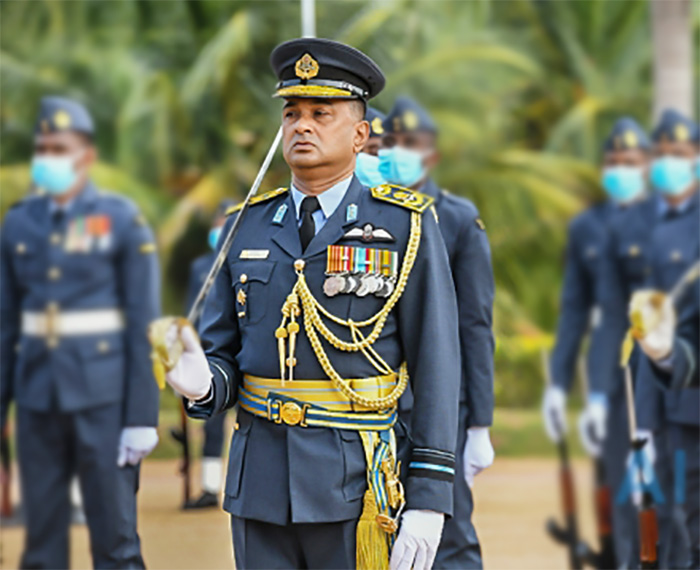
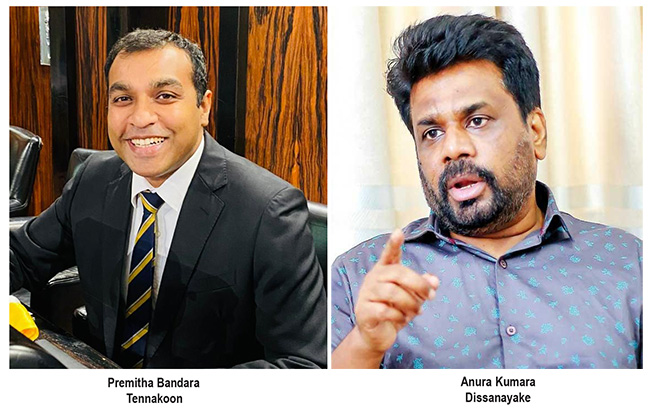 The Aerial Tribute: The Role of Air Power in Defeating Terrorism in Sri Lanka authored by Dr. Nirosha Mendis at the request of Air Marshal H.D. Abeywickrama
The Aerial Tribute: The Role of Air Power in Defeating Terrorism in Sri Lanka authored by Dr. Nirosha Mendis at the request of Air Marshal H.D. Abeywickrama
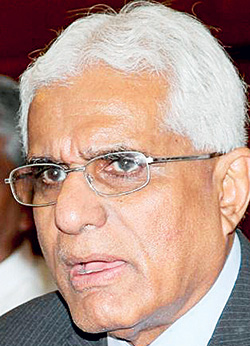
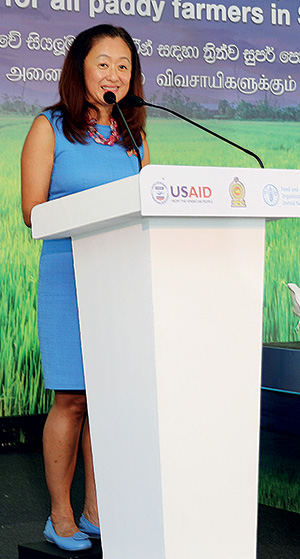
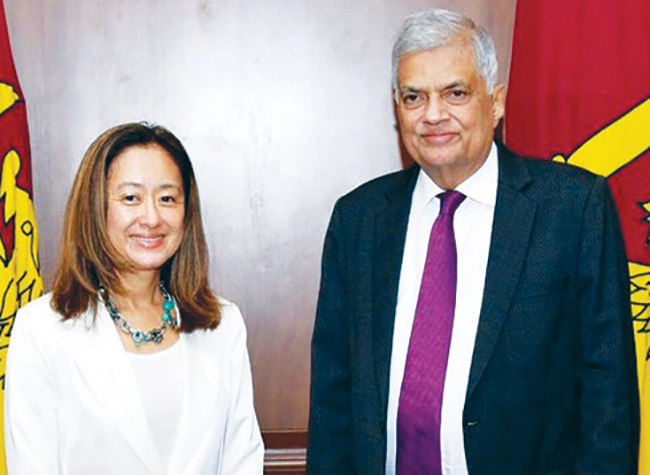
 President Wickremesinghe has now appreciated the role played by three economists in Sri Lanka’s economic recovery. The President should also take tangible measures to investigate political parties, and individuals, responsible for the economic meltdown.
President Wickremesinghe has now appreciated the role played by three economists in Sri Lanka’s economic recovery. The President should also take tangible measures to investigate political parties, and individuals, responsible for the economic meltdown.